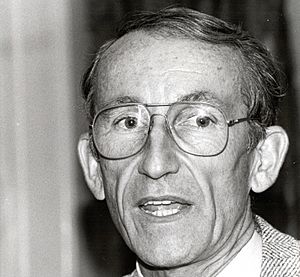Bruno Messerli facts for kids
Quick facts for kids
Bruno Messerli
|
|
|---|---|

Messerli in 1986
|
|
| Born | 17 September 1931 Belp, Canton of Bern, Switzerland
|
| Died | February 4, 2019 (aged 87) |
| Education | Ph.D. |
|
Notable work
|
|
| Spouse(s) | Beatrice |
| Awards |
|
| Scientific career | |
| Influences | Carl Troll |
Bruno Messerli (born September 17, 1931, in Belp, Switzerland – died February 4, 2019) was a Swiss geographer and university professor. He was especially interested in high mountains and how they connect to lower lands. He became a full professor of Geomorphology (the study of how landforms are created) at the University of Bern in 1968. He taught and did research there until he retired in 1996.
Professor Messerli played a big part in making sure that protecting mountains was included in a major global plan. This plan was called Chapter 13 — Managing Fragile Ecosystems — Sustainable Mountain Development in Agenda 21. Agenda 21 was the official action plan from the United Nations Conference on Environment and Development (also known as the Earth Summit). This important meeting happened in Rio de Janeiro in 1992.
Contents
Studying the Earth
Bruno Messerli finished his Ph.D. at the University of Bern in 1962. His research for his doctorate looked at the landforms of the Sierra Nevada mountains in Andalusia, Spain. Later, for his post-doctoral work, he studied how glaciers shaped mountain ranges around the Mediterranean Sea during the Quaternary glaciation period.
A Career in Geography
Dr. Messerli became a full professor of geography at the University of Bern in 1968. He led the Institute of Geography from 1978 to 1983. He also served as the Rector (like a president) of the university from 1986 to 1987. In 1996, he became a Professor Emeritus, meaning he retired but kept his title.
Professor Messerli was the President of the International Geographical Union (IGU) from 1996 to 2000. He also helped lead a project called Past Global Changes (PAGES) from 1996 to 2001. This project was part of the International Geosphere-Biosphere Programme.
Focus on Mountains
Messerli worked on the Himalayan Highland-Lowland Interactive Project for the United Nations University. He worked with another professor named Jack D. Ives. He was also a main founder of the International Centre for Integrated Mountain Development (ICIMOD). This is an organization in Kathmandu, Nepal, that studies mountain systems.
With Jack Ives, Messerli was one of the key people who pushed for a "Mountain Agenda." This agenda aimed to protect mountains and was included in the 1992 Rio Declaration. He also helped start the Mountain Research Initiative (MRI) in Switzerland. He worked closely with the UN's Food and Agriculture Organization (FAO), which oversees the Mountain Agenda.
Awards and Recognition
Bruno Messerli received many important awards for his work:
- 1988: He was added to the Global 500 Roll of Honour by the United Nations Environment Programme (UNEP).
- 1990: He won the Marcel Benoist Prize, a major Swiss science award.
- 2002: He received the King Albert I Gold Medal.
- 2002: He was awarded the Founder's Medal by the Royal Geographical Society.
- 2002: He received a medal from the FAO for the UN - International Year of Mountains. This was given at the Global Mountain Summit in Bishkek, Kyrghyzstan.
Key Publications
Professor Messerli wrote or edited several important books and papers, often with other experts:
- With H. Oeschger and M. Svilar (ed.): Climate: Analysis and Models, History and Future. Berlin, Heidelberg, New York, 1980. Springer‐Verlag.
- With JD Ives (ed.): Mountain Ecosystems, Stability and Instability. Spec. Publ. IGU Congress Paris - Alps 1984. Mountain Research and Development.
- With E. Brugger, G. Furrer and P. Messerli (ed.): Upheaval in the mountain area. The development of the Swiss mountain area between independence and dependence from an economic and ecological point of view. Main publishing house, Berne 1984.
- With T. Hofer: Floods in Bangladesh. History, Dynamics and Rethinking the Role of the Himalayas. United Nations University Press, Tokyo / New York 2006.
 | Lonnie Johnson |
 | Granville Woods |
 | Lewis Howard Latimer |
 | James West |

